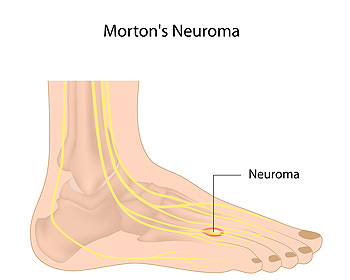 Pain and discomfort that is felt on the ball of the foot may indicate the presence of a condition that is known as Morton’s neuroma. Additionally, the pain may be felt at the base of the toes, and patients have noticed that it feels like they are standing on pebbles. Other symptoms can include numbness or tingling, and walking may be difficult. A common cause of this condition is wearing shoes that are too tight, and which do not have adequate room for the toes to move freely in. Wearing these types of shoes can cause irritation in the nerve, gradually putting pressure on that portion of the foot. There are existing medical conditions that are often associated with Morton’s neuroma. These can include bunions, hammertoes, and flat feet. After a proper diagnosis is performed, mild relief can be found in performing stretching techniques that may be helpful in loosening the tendons, in addition to elevating and massaging the affected foot. Please consult with a podiatrist if you feel you may have developed Morton’s neuroma, so that the proper treatment can begin.
Pain and discomfort that is felt on the ball of the foot may indicate the presence of a condition that is known as Morton’s neuroma. Additionally, the pain may be felt at the base of the toes, and patients have noticed that it feels like they are standing on pebbles. Other symptoms can include numbness or tingling, and walking may be difficult. A common cause of this condition is wearing shoes that are too tight, and which do not have adequate room for the toes to move freely in. Wearing these types of shoes can cause irritation in the nerve, gradually putting pressure on that portion of the foot. There are existing medical conditions that are often associated with Morton’s neuroma. These can include bunions, hammertoes, and flat feet. After a proper diagnosis is performed, mild relief can be found in performing stretching techniques that may be helpful in loosening the tendons, in addition to elevating and massaging the affected foot. Please consult with a podiatrist if you feel you may have developed Morton’s neuroma, so that the proper treatment can begin.
Morton’s neuroma is a very uncomfortable condition to live with. If you think you have Morton’s neuroma, contact Dr. Mark Gagnon of Advanced Podiatry. Our doctor will attend to all of your foot care needs and answer any of your related questions.
Morton’s Neuroma
Morton's neuroma is a painful foot condition that commonly affects the areas between the second and third or third and fourth toe, although other areas of the foot are also susceptible. Morton’s neuroma is caused by an inflamed nerve in the foot that is being squeezed and aggravated by surrounding bones.
What Increases the Chances of Having Morton’s Neuroma?
- Ill-fitting high heels or shoes that add pressure to the toe or foot
- Jogging, running or any sport that involves constant impact to the foot
- Flat feet, bunions, and any other foot deformities
Morton’s neuroma is a very treatable condition. Orthotics and shoe inserts can often be used to alleviate the pain on the forefront of the feet. In more severe cases, corticosteroids can also be prescribed. In order to figure out the best treatment for your neuroma, it’s recommended to seek the care of a podiatrist who can diagnose your condition and provide different treatment options.
If you have any questions, please feel free to contact one of our offices located in Crestwood, Orland Park, and Summit, IL . We offer the newest diagnostic and treatment technologies for all your foot care needs.
